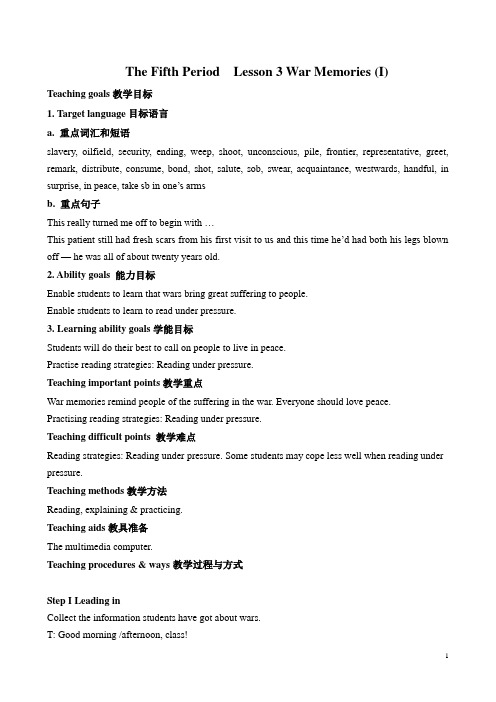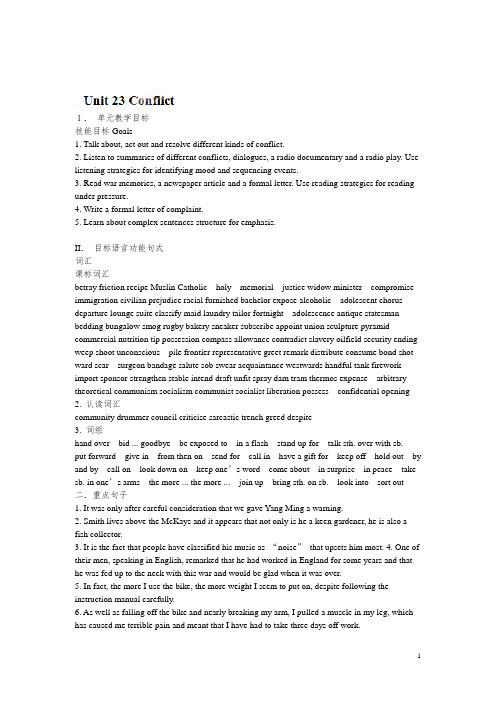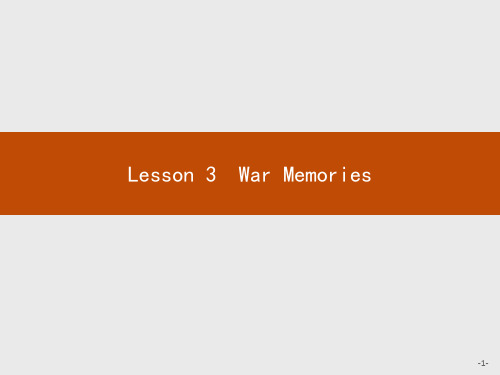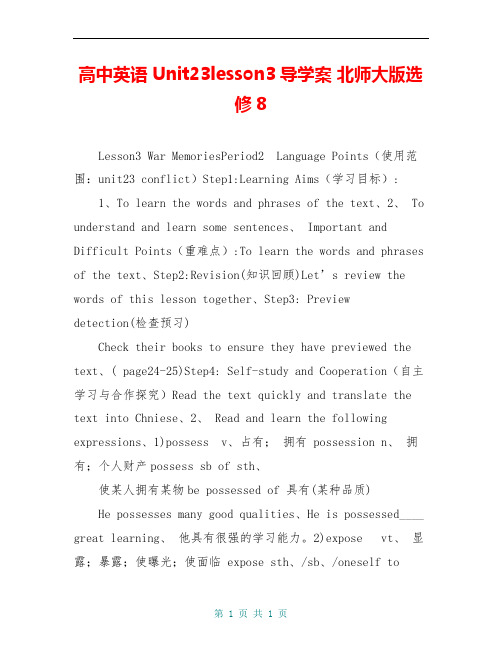高中英语北师大版选修8教案-北师大版选修八_Unit_23_Lesson_3_conflict_Resolution_课堂教学教案
- 格式:doc
- 大小:2.43 MB
- 文档页数:3


The Fifth Period Lesson 3 War Memories (I)Teaching goals教学目标1. Target language目标语言a. 重点词汇和短语slavery, oilfield, security, ending, weep, shoot, unconscious, pile, frontier, representative, greet, remark, distribute, consume, bond, shot, salute, sob, swear, acquaintance, westwards, handful, in surprise, in peace, take sb in one’s armsb. 重点句子This really turned me off to begin with …This patient still had fresh scars from his first visit to us and this time he’d had both his legs blown off — he was all of about twenty years old.2. Ability goals 能力目标Enable students to learn that wars bring great suffering to people.Enable students to learn to read under pressure.3. Learning ability goals学能目标Students will do their best to call on people to live in peace.Practise reading strategies: Reading under pressure.Teaching important points教学重点War memories remind people of the suffering in the war. Everyone should love peace.Practising reading strategies: Reading under pressure.Teaching difficult points 教学难点Reading strategies: Reading under pressure. Some students may cope less well when reading under pressure.Teaching methods教学方法Reading, explaining & practicing.Teaching aids教具准备The multimedia computer.Teaching procedures & ways教学过程与方式Step I Leading inCollect the information students have got about wars.T: Good morning /afternoon, class!Ss: Good morning/ afternoon, Mr. /Ms…T: No one in our class has ever experienced wars. But most of us have seen wars in the movies. Now who will tell us your feeling towards war?S1: Have you ever seen the movie Saving Private Ryan? It is a World War II movie directed by Steven Spielberg. It’s three hours of brutal carnage and exhausted emotions. The message is clear: War is bad. Captain Miller, a stoic enigma to his men, who received some unusual orders from the top. He and his company are to rescue Private James Ryan, who has yet to learn that his three only brothers have all been recently killed in action. He is to be found and brought home alive to his grieving mother.As the men make their way through treacherous enemy territory, risking life and limb, the inevitable question arises: Is one man worth it? Furthermore, don't we all have mothers who will grieve? More pain, loss, blood and tears, which in wartime flows ceaselessly. It is a heavy, heavy movie.S2: If the movie Saving Private Ryan didn’t thoroughly convince you that war is hell, Enemy at the Gates should complete the job. In the winter of 1942, the German and Russian Armies meet in the great Battle of the Stalingrad, one of the most vicious engagements of the Second World War.Enter into this horror a young Russian soldier, formerly a peasant boy with an extraordinary ability to sharpshoot a rifle from far distances. The Russian sniper soon gains fame after killinga record number of German officers causing the Germans to bring in their own sniper expert: awar weathered Major who always accomplishes his mission no matter what the cost is. With the Battle of Stalingrad raging around them, these two men must now fight each other. Killing and bleeding are what war means.T: Last century included two global conflicts, World War I and World War II, and climaxed with the invention of a weapon that killed hundreds of thousands of people, and eventually had the potential to destroy the earth itself.The world has come to accept the recklessness of World War. Today there are organizations such as the United Nations to help keep peace, and instantaneous communication allows people to understand what is happening throughout the world. We are unlikely to experience a global conflict in our time, but it is important to understand how close the world came to ruin, and how the forces of the past century influence our lives. Ok in this class we are going to learn War Memories.Before we learn the four extracts, let’s do a quiz first.Step II Before you startDeal with Before you start.Show the photos of wars on the PowerPoint. Ask students to tell the suffering the wars brought. Then students are asked to work in pairs and do the quiz on Page 103. Then they will work ingroups and discuss why wars start. Before discussing, they should think about the Key Words in Ex 2....Step III Reading StrategiesRead to learnBefore dealing with reading, ask students to read the reading strategies individually and Teachers explains the strategies to students.T: In this class we are going to learn Lesson 3 War Memories, which include four passages. Before reading the text, let’s learn the reading strategies: Reading under pr essure. Please read the strategies aloud.After learning the reading strategies, ask students to skim the text and do Ex 4-6. Remind students that they have only 20 minutes to do the exercises.Step IV ReadingDeal with Ex 4.Ask students to work individually, skim the four passages and using the strategies to match the titles with the extracts. Remind students there is one extra title that they do not need. Four minutes later check the answers with the whole class.Deal with Ex 5.Ask students to read the text carefully and complete the gaps in Text B with the given sentences. Students should work individually. Remind students there is one extra sentence that they do not need. Students are given four minutes to complete the gaps. Four minutes later check the answers with the whole class.Deal with Ex 6.Students are given 10 minutes to read the extracts carefully and then choose the best alternative to complete each sentence, a, b, c or d. Students should work individually. After checking the answers, ask students to read the sentences together. Show the sentences on the PowerPoint so that they can have a better understanding of the extracts. Then ask students to sum up the sentences to describe the wars.T: Now work in groups and summarize the extracts.Six minutes later, ask students to present the summaries of the four extracts.SummaryA: American soldiers ordered all of the villagers to sit in the square and shoot them. Chuc survivedbecause he was wounded in the leg and almost unconscious, but he was covered by a pile of dead bodies and thus saved.B: The troops got together on Christmas Day because they were tired of the war.C: A young soldier who had both his legs blown off happened to be number twenty thousand to come through the hospital. He was going to get an award. When the general handed him the watch, he refused, because the watch couldn’t help him walk. And he cried.D: We could do nothing to help when we saw a plane with five on fire. Because there was danger of an explosion with bombs and petrol.Step V ExplanationDuring this procedure Teacher will play the tape for students. Students will underline the difficult sentences. After listening to the tape, Teacher will explain the text and deal with language problems. T: Now we will deal with some difficult language focuses. Now I will play the tape for you. Please make marks where you have difficulties.After listening to the tape, explain the difficult sentences to students. Before explaining the difficult points, students are asked to refer to the notes to the text on Page 115-116.T: Do you have any difficulty in the text?S1: Could you please explain the sentence in Extract C line 3 “This really turned me off to begin with …”?T: I think the third sentence in Ex 6 will help you understan d the sentence. Let’s read the sentence together. “The nurse wasn’t enthusiastic about the award ceremony from the start because she didn’t like her boss’s attitude toward the VIPs.” (Show the following on the PowerPoint)turn sb off: cause sb to be bored or disgusted by sth.It really turns me off when Richard wears his smelly socks to bed.You could see him turn off as the speaker droned on.The radio turned me off, so I turned it off.That song really turns me off.The play turned the audience off.Any other question?S2: In Extract C line 6 “This patient still had fresh scars from his first visit to us and this time he’d had both his legs blown off —he was all of about twenty years old.” Could you explain it to us? T: From the text we learn that the soldier was very young — probably more than 20 years old. But this was his second time to be sent to the hospital. It was not long before he was sent to hospitalagain, for his scars were still fresh. But this time he lost both his legs. That was why he refused the award. He needed his legs to walk. He was very sad to have lost his legs in the war. Wars have left thousands of people disabled. I hope all of governors can realize this and they can resolve the conflict in a peaceful way. Any other questions?Ss: No.T: Ok, so much for the text. Today’s homework is to find more about wars so that you can understand the sentence “Wars are fought for many different reasons. Some are fought for the good of mankind. Others are the result of man’s greed and prejudices.” Some one say the cause was the same as every other war; greed. The lies, excuses, & justifications, are still around today.And the same will be true of the next war, and the one after that, and so infinitude. Which opinion are you for and give your supporting reasons.Step VI Homework1. Get prepared for Ex 8 on Page 25. Find enough information on wars from the library or on the Internet.2. Finish exercises in Remember on Page 71.。

I.单元教学目标技能目标Goals1. Talk about, act out and resolve different kinds of conflict.2. Listen to summaries of different conflicts, dialogues, a radio documentary and a radio play. Use listening strategies for identifying mood and sequencing events.3. Read war memories, a newspaper article and a formal letter. Use reading strategies for reading under pressure.4. Write a formal letter of complaint.5. Learn about complex sentences structure for emphasis.II.目标语言功能句式词汇课标词汇betray friction recipe Muslin Catholic holy memorial justice widow minister compromise immigration civilian prejudice racial furnished bachelor expose alcoholic adolescent chorus departure lounge suite classify maid laundry tailor fortnight adolescence antique statesman bedding bungalow smog rugby bakery sneaker subscribe appoint union sculpture pyramid commercial nutrition tip possession compass allowance contradict slavery oilfield security ending weep shoot unconscious pile frontier representative greet remark distribute consume bond shot ward scar surgeon bandage salute sob swear acquaintance westwards handful tank firework import sponsor strengthen stable intend draft unfit spray dam tram thermos expense arbitrary theoretical communism socialism communist socialist liberation possess confidential opening 2. 认读词汇community drummer council criticise sarcastic trench greed despite3. 词组hand over bid ... goodbye be exposed to in a flash stand up for talk sth. over with sb.put forward give in from then on send for call in have a gift for keep off hold out by and by call on look down on keep one’s word come about in surprise in peace take sb. in one’s arms the more ... the more ... join up bring sth. on sb. look into sort out 二.重点句子1. It was only after careful consideration that we gave Yang Ming a warning.2. Smith lives above the McKays and it appears that not only is he a keen gardener, he is also a fish collector.3. It is the fact that people have classified his music as “noise”that upsets him most.4. One of their men, speaking in English, remarked that he had worked in England for some years and that he was fed up to the neck with this war and would be glad when it was over.5. In fact, the more I use the bike, the more weight I seem to put on, despite following the instruction manual carefully.6. As well as falling off the bike and nearly breaking my arm, I pulled a muscle in my leg, which has caused me terrible pain and meant that I have had to take three days off work.三.语法Complex sentence (I) EmphasisSeldom has drumming caused such conflict. Had we known, we wouldn’t have done . Rarely had Laurene seen McKay move so fast.Perfect verb formswill have done.. have been doing had done having done to have doneshould have done四.交际用语1. ArguingJust stop doing ...You’re always doing ...I wish you wouldn’t ...Why don’t you ...?Why don’t you ...?Why should I ...?You never do ...Why do you always have to ...?I don’t see why ...If you don’t, I’ll ...If you do that, I’ll ...2. Exaggeration and understatementMy feet are blocks of ice.3. Reacting to suggestionThat’s a good idea.III.教材分析与教材重组教材分析本单元以冲突为话题,揭示了现实生活中的各种矛盾与冲突。



高中英语 Unit23lesson3导学案北师大版选修8Lesson3 War MemoriesPeriod2 Language Points(使用范围:unit23 conflict)Step1:Learning Aims(学习目标):1、To learn the words and phrases of the text、2、 To understand and learn some sentences、 Important and Difficult Points(重难点):To learn the words and phrases of the text、Step2:Revision(知识回顾)Let’s review the words of this lesson together、Step3: Previewdetection(检查预习)Check their books to ensure they have previewed the text、( page24-25)Step4: Self-study and Cooperation(自主学习与合作探究)Read the text quickly and translate the text into Chniese、2、 Read and learn the following expressions、1)possess v、占有;拥有 possession n、拥有;个人财产possess sb of sth、使某人拥有某物be possessed of 具有(某种品质)He possesses many good qualities、He is possessed____ great learning、他具有很强的学习能力。
2)expose vt、显露;暴露;使曝光;使面临 expose sth、/sb、/oneself to显露,暴露be exposed to 暴露于用expose的适当形式填空(1)In summer, _______________the sun can be very harmful to your skin、(2)The soil was washed away by the flood, __________ bare rocks、单项填空The more one is ________ the English speaking environment, the better he or she will learn the language、exposed toB、filled inC、caught onD、kept up3)Bill distributed the beer among us and we consumed the lot、 consume 作及物动词,意为:① 吃,喝;②消耗,耗费(时间、能源或燃料等);③毁灭,烧毁。
Period Three Lesson 3War MemoriesⅠ.单词自测1.security n.安全secure adj.可靠的,安全的2.ending n.结局,结尾3.weep v t.& v i.哭泣,流泪sob v i.抽泣,呜咽4.shoot v t.& v i.射击5.unconscious adj.失去知觉的6.representative n.代表represent v t.代表7.greet v t.问候,致意greeting n.问候(常用复数)8.remark v t.说起,谈到9.distribute v t.分发,分配distribution n.分配,配给10.consume v t.喝;消耗,消费consumption n.消费;吃喝consumer n.消费者11.salute v t.向……致敬12.swear v i.发誓13.acquaintance n.相识的人14.handful n.少数,一些15.firework n.烟火,烟花Ⅱ.短语自测1.have_no_reason_to_do...没有理由干……2.in_surprise吃惊地,惊奇地3.be_fed_up_with...对……烦透了4.come_to_an_understanding达到一致,达成谅解5.in_peace和平地6.turn_sb.off令某人厌烦/反感7.more_or_less或多或少,几乎8.take_sb.in_one's_arms拥抱某人9.get_through打通(电话);完成;通过10.a_handful_of少量的1.One of their men,speaking in English,remarked_that he had worked in England for some years and_that he was fed up to the neck with this war and would be glad when it was over.他们之中有一个人会说英语,他说他在英格兰工作过好几年,他对这场讨厌的战争烦透了,如果战争结束他会感到高兴的。
Unit 23
Lesson 3 conflict Resolution
Teaching aims
1.words and phrases:
2.to practise listening strategies for identifying mood
3.to practise using phrasal verbs
4.to practise using the language of arguing
5.pronunciation and speaking
Teaching time
Two periods(两课时连堂)
Teaching process
Step 1 Revision
Review the new words of lesson 2 and have diction
Step 2 learn the new words
1.ask some students to read the new words first and correct their pronunciation
2.play the tape and have them read after the tape
3.give them a few minutes to read the new words freely, tell them if they can’t read the words, encourage them to ask the teacher .
step 3 listening
1.before you start
a)exercise 1:read the instructions first. then let students do the exercise individually. then check their answers.
b)exercise 2:students read and answer the questionnarie,working individually.
2.listen to learn
a)read the listening strategies
b)exercise 3:give students time to read the statements before listening.then play the cassette and do the exercise.
c)exercise 4:listen again and do the exercise. then read the sentences.
step 4 pronunciation
1.let the students read out the words
2.play the tape for students to listen and identify the mood.
3.exercise 6:have students look back at the questionnaire and read out the situations in 2 and
4.give them time to act out the tow situations.
4.exercise 7:read through the exercise first. then play the tape and answer the questions.
step 5 speaking
1.exercise 8:students work in the same pairs as in exercise 7,acting out the roleplays again and this time using the advice from the radio programme.
2.exercise 9:students discuss in pairs and compare their two role-plays and how effective the advice was.
step 6 Homework
Exercise 3 in page 70。